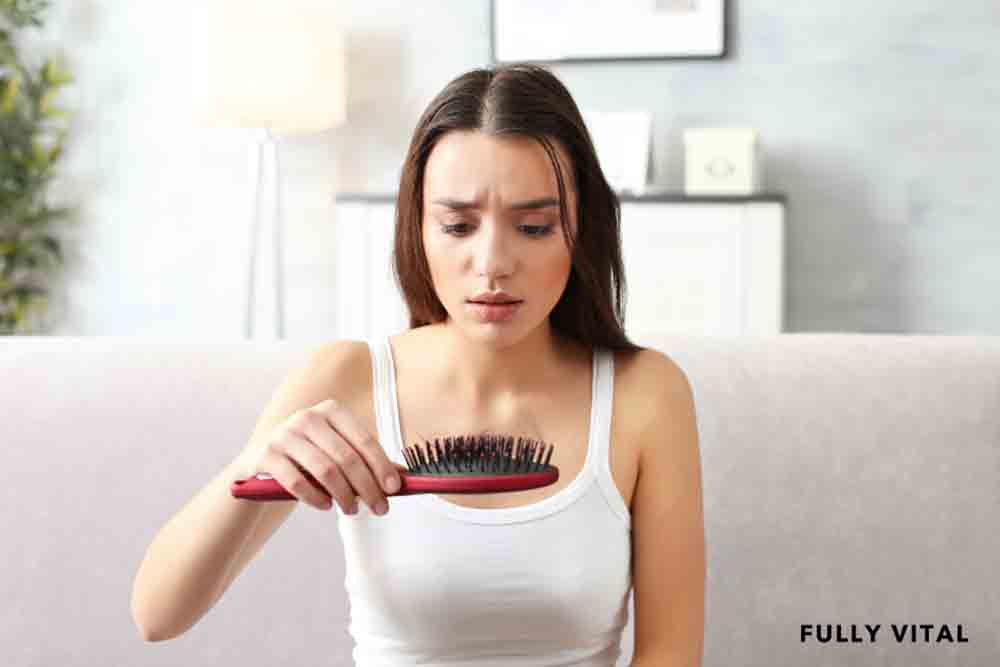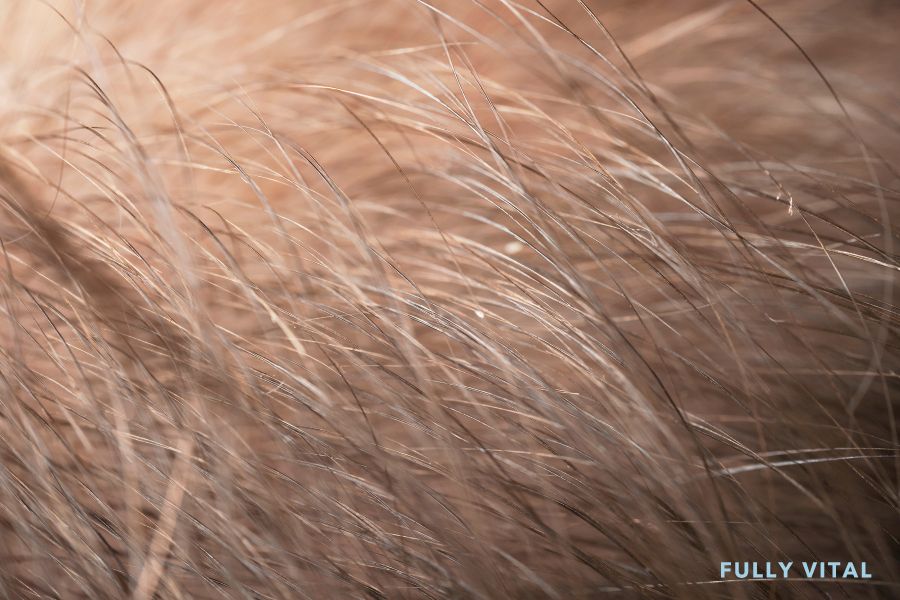
Eclipsed Beauty: Unraveling The Eclipse Between Thyroid Imbalance And Lustrous Locks
In the pursuit of beauty and wellness, one often overlooked factor can cast a shadow on our aspirations – thyroid imbalance.
The intricate dance between thyroid function and hair health is a topic that deserves a spotlight.
Eclipsed Beauty: Unraveling the Eclipse Between Thyroid Imbalance and Lustrous Locks delves into the connection between thyroid issues and hair loss, providing insights and solutions to empower women of all hair types in their journey toward stimulating hair growth.

I LOVE MY HAIR NOW
FullyVital hair serum and hair vitamins made tremendous improvements in my hair. I truly love my hair now.
Dorit S.,
Understanding Thyroid Function
At the heart of this intricate tale lies the thyroid gland – a small powerhouse in your neck that regulates metabolism and energy production.1
Thyroid hormones, namely T3 (triiodothyronine) and T4 (thyroxine), play a pivotal role in various bodily functions, including the growth of your luxurious locks.
The Hair Growth Cycle
To truly understand the intricate relationship between thyroid imbalance and hair loss, it's crucial to explore the fascinating journey of the hair growth cycle.
This natural process consists of distinct phases that collectively determine the health and appearance of your locks.
Anagen Phase (Growth Phase)
Anagen Phase: The foundation of your hair's journey, this phase is all about growth.
The hair bulb is active, and cells divide rapidly, pushing the hair shaft up.
On average, this phase lasts between 2 to 7 years, determining the ultimate length of your hair.
Catagen Phase (Transition Phase)
Catagen Phase: As the growth phase concludes, the hair follicle transitions to a temporary resting state. During this short phase, lasting around 10 days, the lower part of the hair detaches from the blood supply, preparing for the next stage.
Telogen Phase (Resting Phase)
Telogen Phase: Often referred to as the resting phase, this period typically lasts about 3 months. During this time, the old hair remains in the follicle while new hair begins to grow beneath it. Approximately 10-15% of your hair is in this phase at any given time.
Exogen Phase (Shedding Phase)
Exogen Phase: The culmination of the hair growth cycle, this phase involves the shedding of the old hair.
As new hair pushes upward, the old hair is released from the follicle.
On average, about 50 to 100 hairs are shed daily during this phase.
Thyroid Imbalance And Hair Loss
When it comes to the delicate balance of your body's systems, few duos have as much impact on your overall well-being as the thyroid gland and your hair.
The thyroid, that unassuming butterfly-shaped gland at the base of your neck, holds the power to regulate metabolism, energy levels, and yes, even the fate of your beloved tresses.
The Thyroid's Role in Hair Health
The thyroid gland produces two main hormones – thyroxine (T4) and triiodothyronine (T3) – which play an orchestral role in your body's functions.
From controlling your metabolism and temperature to influencing the growth of skin, hair, and nails, these hormones are like the conductors of your body's symphony.
Disrupting the Harmony: Thyroid Imbalance
Hypothyroidism, an underactive thyroid condition, occurs when your thyroid gland doesn't produce enough hormones.
Conversely, hyperthyroidism, an overactive thyroid condition, results from an excessive production of hormones.
Both scenarios can throw your body out of tune, and your hair is often the first to show the effects.
The Hair Connection
Hair growth is a marvelously intricate process that hinges on the right balance of hormones, nutrients, and cellular activity.
Thyroid imbalance can disrupt this harmonious cycle, leading to a range of hair-related issues:
-
Thinning Hair: With an underactive thyroid, hair growth can slow down, leading to thinning of the hair on your scalp.
-
Brittle Hair: Dry, brittle hair that's prone to breakage can be a sign of thyroid dysfunction.
-
Changes in Texture: An imbalance in thyroid hormones can alter the texture of your hair, making it coarser or finer.
-
Excessive Shedding: Both hypo- and hyperthyroidism can trigger excessive hair shedding, often noticeable during showers or brushing.
Regaining the Rhythm: Seeking Solutions
The good news is that addressing thyroid-related hair loss often starts with managing the underlying thyroid issue.
Seeking medical attention and following your healthcare provider's recommendations are pivotal steps.
Additionally, there are ways you can support your hair's health:
-
Nutrition: Ensure your diet is rich in vitamins, minerals, and proteins that promote hair growth, such as biotin, zinc, and iron.
-
Gentle Hair Care: Opt for gentle hair care products and avoid excessive heat styling to minimize stress on fragile hair.
-
Stress Management: High stress levels can exacerbate hair loss, so practicing stress-reduction techniques can be beneficial.

Identifying Thyroid-Related Hair Loss
In a world filled with potential culprits of hair loss, identifying thyroid-related factors is key.
Identifying Thyroid-Related Hair Loss sheds light on the signs to watch for.
From changes in hair texture to diffuse thinning, understanding these signals can empower you to take charge of your hair's destiny.
Managing Thyroid-Related Hair Loss
The quest for lustrous locks in the face of thyroid-related hair loss leads us to the chapter on Managing Thyroid-Related Hair Loss.
From medical interventions to lifestyle adjustments, there's a spectrum of strategies to explore.
Discover ways to work hand-in-hand with healthcare professionals and regain control of your hair's vitality.
What Is Thyroid Hair Loss?
Thyroid hair loss, medically known as "telogen effluvium," is a phenomenon that occurs when disruptions in thyroid hormone levels impact the natural hair growth cycle.
This leads to increased hair shedding, thinning, and changes in hair texture.
Let's delve deeper into this often-misunderstood issue and shed light on its intricacies.
Understanding the Basics
-
Hair Growth Cycle: Your hair goes through various phases, including growth, rest, and shedding. Thyroid imbalances can disturb this cycle, triggering hair loss.
-
Telogen Effluvium: The specific type of hair loss associated with thyroid issues is known as telogen effluvium, where more hairs than usual enter the resting phase, resulting in noticeable shedding.
Why Is Thyroid Hair Loss Important?
Thyroid hair loss isn't merely a cosmetic concern – it serves as a potent indicator of your overall health.
Delving into the importance of this phenomenon goes beyond the surface, revealing valuable insights about your body's well-being.
A Clue to Your Inner Health
-
Early Warning Signal: Thyroid-related hair loss can often be one of the earliest signs of thyroid dysfunction. Detecting it promptly can lead to timely medical intervention.
-
Internal Balance: Your hair acts as a mirror reflecting your internal balance. Hair loss due to thyroid issues hints at the intricate relationship between your body's systems.
Beyond Aesthetics
-
Self-Image and Confidence: Hair plays a crucial role in self-perception and confidence. Addressing thyroid-related hair loss can positively impact how you perceive yourself.
-
Holistic Wellness: Restoring hair health through thyroid care is a step towards overall well-being. It signifies your commitment to harmonizing the complex interplay of bodily functions.
How Does Thyroid Hair Loss Work?
Thyroid hair loss operates within the complexities of hormonal imbalance and the hair growth cycle.
Understanding its workings empowers you to take informed steps toward restoration.
The Mechanism Unveiled
-
Hormonal Disruption: Thyroid hormones influence hair follicles' growth and resting phases. Imbalances disrupt this balance.2
-
Telogen Phase Prolongation: Thyroid issues can extend the resting phase, leading to excessive shedding and thinning.
What Are The Benefits Of Thyroid Hair Loss?
While thyroid hair loss can be distressing, addressing it brings forth various benefits that extend beyond hair health alone.
The Positive Outcomes
-
Improved Thyroid Function: Treating the underlying thyroid imbalance not only supports hair growth but also enhances overall wellness.3
-
Boosted Confidence: Regaining healthy hair can significantly boost self-esteem and confidence.
Are There Any Downsides To Thyroid Hair Loss?
While addressing thyroid hair loss holds numerous benefits, it's essential to consider potential downsides and challenges as well.
Navigating the Challenges
-
Time and Patience: Hair regrowth takes time, demanding patience throughout the process.
-
Multifactorial Nature: Hair health is influenced by various factors; solely treating thyroid imbalance might not be a one-size-fits-all solution.
What Are The Alternatives To Thyroid Hair Loss?
When it comes to managing hair loss, considering alternatives to solely targeting thyroid imbalance is a comprehensive approach.
Comprehensive Solutions
-
Topical Treatments: Products containing minoxidil or other hair-growth promoting ingredients can aid in stimulating hair regrowth.
-
Diet and Supplements: Nutrient-rich diets and supplements like biotin can support overall hair health.
-
Lifestyle Adjustments: Managing stress and practicing self-care contribute to maintaining vibrant hair.

Experience Revitalized Hair With Fully Vital!Discover the power of science-backed hair growth products that go beyond beauty – they're about restoring confidence and nurturing a healthier bond with your hair. Key Features:
Benefits:
At Fully Vital, we're not just offering products – we're offering a path to empowerment. Join us in this journey toward healthier, more resilient hair that reflects your inner vitality. |
Final Thoughts On Thyroid Hair Loss
In the intricate tapestry of health and beauty, the relationship between thyroid function and hair health is an essential thread that often goes unnoticed.
We've journeyed through the complexities of thyroid hair loss, unveiling its causes, effects, and potential solutions.
Remember, your hair's vibrancy is a reflection of your inner well-being, and addressing thyroid imbalances can be a pivotal step towards nurturing both.
As we've explored the history, current landscape, and future possibilities surrounding thyroid hair loss, it's evident that this topic resonates deeply with individuals seeking to maintain their hair's youthful vitality.
At Fully Vital, we understand the significance of a healthy relationship with your locks.
Our range of hair growth products is designed to support your journey, offering innovative solutions that align with your unique needs.
Embrace the power of knowledge, make informed choices, and take proactive steps toward restoring and enhancing your hair's natural beauty.
Here's to embracing lustrous locks and a more confident, vibrant you.
Frequently Asked Questions About Thyroid Hair Loss
Can thyroid problems really cause hair loss?
Yes, thyroid imbalances can disrupt the hair growth cycle, leading to hair loss.
Can lifestyle changes aid in managing thyroid-related hair loss?
Certainly, adopting a balanced diet and managing stress can complement medical interventions.
How soon should I seek professional help for my hair loss concerns?
If you suspect thyroid involvement, consulting a healthcare provider promptly is advisable.
Is Thyroid-Related Hair Loss Permanent?
Thyroid-related hair loss is often reversible with appropriate treatment. Once thyroid imbalances are managed, hair regrowth can occur over time.
Can Hair Supplements Alone Fix Thyroid Hair Loss?
While supplements like biotin and collagen can support hair health, addressing the underlying thyroid issue is crucial for long-term results.
Will Thyroid Medication Lead to Immediate Hair Regrowth?
Thyroid medication takes time to rebalance hormone levels.
Hair regrowth is a gradual process that requires patience and consistent management.
Are There Specific Hairstyles to Avoid During Thyroid Hair Loss?
Avoid tight hairstyles that can strain hair follicles.
Opt for loose styles that minimize tension on the hair shafts.
Can an Overactive Thyroid Cause More Hair Loss Than an Underactive Thyroid?
Both hypo- and hyperthyroidism can contribute to hair loss, but the extent can vary from person to person.
Are There Certain Foods to Include or Avoid for Thyroid Hair Loss?
A balanced diet rich in nutrients like iron, zinc, and omega-3 fatty acids supports hair health.
Avoid crash diets or extreme restrictions.
Can Coloring or Styling Hair Exacerbate Thyroid Hair Loss?
Excessive heat styling and harsh chemicals can weaken hair, making it prone to breakage.
Gentle hair care practices are recommended.
Is Postpartum Hair Loss Related to Thyroid Issues?
Postpartum hair loss is common due to hormonal changes after childbirth. Thyroid imbalances can exacerbate this, so monitoring thyroid health is important.
Sources:
-
NCBI. (2018, April 19). How Does the Thyroid Gland work? Nih.gov; Institute for Quality and Efficiency in Health Care (IQWiG). https://www.ncbi.nlm.nih.gov/books/NBK279388/
-
Grymowicz, M., Rudnicka, E., Podfigurna, A., Napierala, P., Smolarczyk, R., Smolarczyk, K., & Meczekalski, B. (2020). Hormonal Effects on Hair Follicles. International Journal of Molecular Sciences, 21(15), 5342. https://doi.org/10.3390/ijms21155342
-
Contreras-Jurado, C., Lorz, C., García-Serrano, L., Paramio, J. M., & Aranda, A. (2015). Thyroid hormone signaling controls hair follicle stem cell function. Molecular Biology of the Cell, 26(7), 1263–1272. https://doi.org/10.1091/mbc.E14-07-1251







